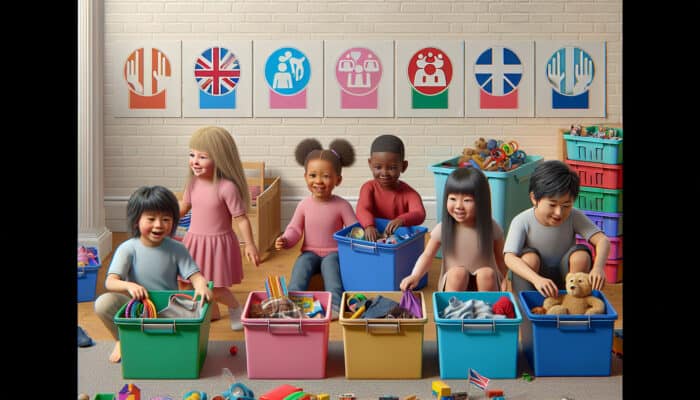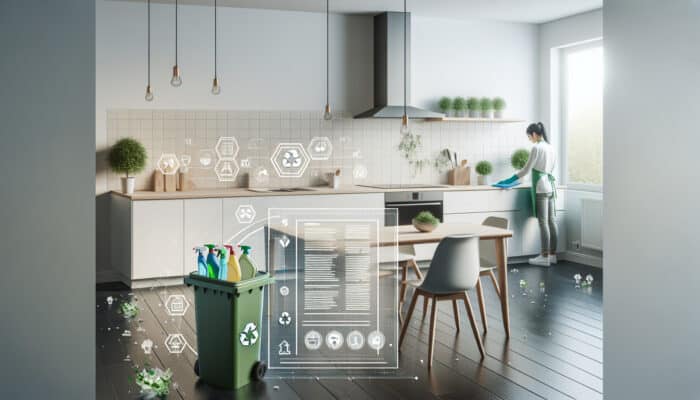Transform Your Home with Innovative Eco-Friendly Decluttering Techniques
Empower Your Children to Sort and Donate Items Effectively

Encouraging your children to actively participate in the decluttering process by sorting their toys and clothes can transform this often mundane task into an enjoyable and educational experience. By teaching them to identify items they have outgrown or no longer use, you instil a sense of responsibility and empathy. Organising a family ‘donation day’ can become an exciting event where kids choose items to donate to local UK charities like Oxfam or Barnardo’s. This not only serves as a practical lesson in decluttering but also introduces them to the concept of charity, effectively reducing waste while promoting community engagement and social responsibility.
Make the sorting process more engaging by transforming it into a fun game. Set a timer and challenge them to quickly categorise their belongings, encouraging creativity in deciding what to keep versus what to donate. This playful approach maintains their interest, increasing the likelihood that they will enjoy participating. You can establish categories such as toys, clothes, and books, allowing children to witness the tangible impact of their choices—less clutter in their rooms and items that can assist others in need.
When children see their toys or clothes being donated to a worthy cause, it instils a profound sense of pride and accomplishment within them. This strategy not only clears your home of clutter but also teaches them about empathy, reinforcing the notion that their contributions can significantly impact someone else's life. This invaluable lesson in altruism and sustainability is a crucial aspect of their upbringing that will serve them well into adulthood, shaping them into socially conscious individuals.
Fostering Creativity by Repurposing Old Items in Innovative Ways
Repurposing old furniture or toys is an excellent method to ignite creativity in children while simultaneously promoting sustainability. This engaging activity teaches them that items can have multiple lives and do not necessarily need to end up in a landfill. For instance, an old wooden chair can be creatively transformed into a charming plant stand, or a cardboard box might become an imaginative playhouse, sparking their creativity and resourcefulness. This not only nurtures their inventive spirit but also fosters a mindset geared towards eco-friendly living.
Involving kids in these projects equips them with hands-on skills and reinforces the importance of recycling principles. The pride they feel when transforming something ‘old' into something new can be immense. Encourage them to brainstorm ideas and support them throughout the creative process, which enhances their self-confidence and problem-solving abilities. By participating in these activities, children learn valuable lessons about the significance of reducing waste and valuing resources.
Furthermore, these repurposed items can add a unique, personal touch to your home, transforming it into a space filled with cherished memories and creativity. You might even consider documenting these projects through photographs and compiling them into an art book that showcases their creativity and the eco-friendly mindset you've nurtured together. This not only preserves memories but also serves as a continual reminder of the importance of sustainability in their lives.
Teaching Children the Value of Selling Unwanted Items
Utilising online platforms in the UK, such as eBay, Facebook Marketplace, or Gumtree, to sell items that children no longer need is an excellent way to instil a sense of value in their belongings. This process not only involves them in financial literacy but also encourages recycling and sustainable practices. Teaching children the art of negotiation and the value of their possessions empowers them to make informed decisions.
Start by explaining how selling unwanted items can create space in your home while contributing to the circular economy, where goods are reused instead of discarded. Help them set up listings by taking appealing photographs and writing engaging descriptions, which will enhance their digital literacy skills. Additionally, involving them in the negotiation process teaches valuable lessons about value and transaction, further enhancing their understanding of commerce.
Moreover, the income generated from these sales can be saved for something they desire or donated to a cause of their choice, reinforcing the idea of earning money through sustainable practices. This approach not only teaches them entrepreneurial skills but aligns perfectly with the ethos of clearing a UK home with kids in a green manner, promoting mindful consumption and waste reduction while encouraging a sense of social responsibility.
Implementing Sustainable Cleaning Practices for a Healthier Home Environment

Crafting Natural Cleaning Solutions Together for a Safer Home
Creating natural cleaning solutions from everyday household items can be an enjoyable and educational activity for children. Instead of opting for harsh chemicals, consider teaching your children how to make eco-friendly cleaners using simple ingredients like vinegar, baking soda, and essential oils. This not only ensures a safer environment for them but also instils a strong foundation for sustainable practices, showing them that effective cleaning can be achieved without harming the planet.
Begin by involving them in measuring and mixing the ingredients. Explain the science behind why these ingredients are effective cleaners, turning it into a mini chemistry lesson in the kitchen. Children often take immense pride in creating their cleaning solutions, understanding that they are making choices that positively impact the environment. This hands-on involvement fosters a connection to sustainable living while reinforcing their ability to contribute to a cleaner home.
Encourage them to use these natural cleaners during their cleaning tasks. This hands-on approach allows them to see the positive results of their efforts, fostering a sense of accomplishment. Additionally, you can discuss how these alternatives are better for the planet, as they reduce chemical runoff and plastic waste—key principles in clearing a UK home with kids in a green manner that promote a healthier living environment.
Switching to Reusable Cleaning Tools for a Greener Home
Transitioning to reusable cleaning tools is a crucial step in minimising waste. Introducing children to washable cloths, sponges, and mops teaches them the importance of sustainability and responsible consumption. By showing them the stark contrast between disposable products and their reusable counterparts, you reinforce the value of making environmentally-friendly choices. This awareness can significantly influence their purchasing decisions in the future.
Encourage children to choose their cleaning tools, allowing them to express their preferences while ensuring they grasp the rationale behind these choices. Develop a fun routine where they are responsible for maintaining their cleaning tools, fostering a sense of ownership and responsibility. This empowerment encourages them to take pride in their contributions to household chores.
Moreover, incorporate educational discussions about the impact of single-use products on waste management and the environment. These conversations will help children connect their actions to larger environmental issues, making them more aware and proactive about sustainable living practices. This critical understanding not only benefits their immediate environment but also prepares them for a lifetime of environmentally responsible behaviours.
Practising Energy-Efficient Cleaning Techniques for Sustainable Living

Teaching children about energy-efficient cleaning practices can have a lasting impact on their understanding of sustainability. Demonstrate effective cleaning methods that conserve both water and energy. For instance, illustrate how to vacuum efficiently by explaining that cleaning in sections is more effective than starting and stopping frequently, which wastes energy and time. This practical knowledge equips them with skills for efficient home management.
Turn it into a fun challenge to see how much water they can save while washing surfaces or how to use less detergent effectively. Incorporating these lessons into their daily routines reinforces eco-conscious habits. Consider implementing a reward system for using minimal resources during chores, encouraging them to think critically about their actions and their environmental impact. This gamified approach makes learning about sustainability enjoyable and engaging.
Discuss the broader context of energy conservation, such as its connection to climate change and resource depletion. Children who grasp these connections are likely to grow into adults who prioritise sustainability, making energy-efficient cleaning a vital lesson in the journey towards a greener UK home with kids. This foundational knowledge empowers them to advocate for sustainable practices in their future communities.
Implementing Waste Sorting and Recycling Practices for a Sustainable Future
Teaching children how to sort waste accurately is a fundamental skill essential for a sustainable lifestyle. Educating them about various recycling categories—such as paper, plastics, metals, and organics—will empower them to make informed choices regarding waste management. You can create a fun sorting game at home by establishing bins for different materials and challenging kids to sort them correctly, making learning interactive and enjoyable.
Make this learning process interactive by taking trips to local recycling facilities, where they can witness the recycling process firsthand. This real-world experience solidifies their understanding and demonstrates the impact of their actions. Incorporate discussions about what happens to materials after they are recycled, helping children grasp the importance of reducing landfill waste and understanding the lifecycle of products.
Encourage participation in community recycling initiatives or school programs, further fostering a sense of responsibility and teamwork. By teaching children the significance of recycling, you guide them to become active participants in their communities, thereby enhancing the principles of clearing a UK home with kids in a green manner. This involvement builds a foundation for lifelong eco-conscious behaviours.
Implementing Green Storage Solutions for a Clutter-Free Home
Transforming Old Containers Through Creative Upcycling for Sustainable Storage
Upcycling storage containers is both a practical and creative way to teach children about sustainability. Instead of purchasing new storage solutions, utilise old boxes, jars, and containers that would otherwise be discarded. Engage children in brainstorming ideas on how to repurpose these items while nurturing their creativity. For instance, a shoe box can be transformed into a decorative storage unit for craft supplies, while glass jars can serve as pots for small plants, showcasing the potential of everyday items.
Encourage kids to personalise their upcycled containers with paint or stickers, transforming them into unique storage solutions that reflect their personalities. This hands-on project teaches them that waste can be repurposed into something useful, reinforcing the message of reusing and recycling. This process not only fosters creativity but also nurtures a sense of environmental responsibility.
Additionally, demonstrate how upcycling contributes to sustainability by reducing the demand for new materials and minimising waste. Children who understand the value of repurposing items are more likely to adopt eco-friendly habits as they grow older, aligning perfectly with the ethos of clearing a UK home with kids in a green manner. This understanding will empower them to make conscious choices about consumption in their future lives.
Choosing Eco-Friendly Materials for Sustainable Storage Solutions
When selecting storage solutions, choosing eco-friendly materials is crucial. Discuss the importance of sustainable materials, such as bamboo, recycled plastics, or organic cotton, with your children. Encourage them to participate in the selection process when purchasing new storage items, reinforcing their understanding of the environmental impact that materials can have. This involvement fosters a sense of ownership and responsibility.
You might explore local shops or online retailers together, discussing the benefits of eco-conscious choices. Teach them how products made from recycled materials help reduce waste and conserve resources, strengthening their connection to sustainable practices. This practical application of knowledge enhances their critical thinking skills regarding consumerism.
Moreover, create a ‘green checklist’ for any new storage items purchased, including factors like material sustainability, durability, and whether the item is recyclable at the end of its life. This process instils critical thinking about consumption in children, encouraging them to make informed and responsible choices that contribute to a sustainable future.
Collaborative Organising with Kids Using Eco-Friendly Storage Solutions
Involving children in organising their spaces with green storage solutions can foster a sense of responsibility and ownership. Begin by asking them to sort through their belongings, deciding what to keep, donate, or repurpose through upcycling. This helps them grasp the significance of maintaining a tidy and sustainable living environment, teaching them valuable life skills.
Establish zones in their rooms for different activities—study, play, and rest—utilising eco-friendly storage solutions to keep everything organised. Encourage them to express their creativity by personalising their spaces, using the upcycled containers they created earlier. This empowerment allows them to take pride in their living environment.
This collaborative effort not only tidies up your home but also teaches children the value of organisation and sustainability. It reinforces the notion that taking care of one’s belongings is an essential aspect of living sustainably, aligning perfectly with clearing a UK home with kids in a green manner. This understanding fosters their commitment to eco-friendly practices in their everyday lives.
Educating Kids About Effective Recycling Practices for Sustainable Living
Understanding Different Recycling Categories for Better Waste Management
Educating children about the various categories of recycling is crucial for fostering a sustainable mindset. Begin by explaining the different materials that can be recycled, including plastics, paper, metals, and glass. Creating a visual chart that illustrates what can be recycled and what cannot serves as an effective teaching tool, making the information more digestible for them. This clear guidance helps them navigate recycling in real-life scenarios.
Organise fun activities such as scavenger hunts where kids search for items around the house that fit into the recycling categories. This hands-on approach reinforces their understanding of what is recyclable, making learning enjoyable and memorable. Incorporating games into education enhances engagement and retention of knowledge.
Take regular trips to local recycling centers, allowing them to experience the recycling process firsthand. Witnessing the impact of their recycling efforts will motivate them to adopt responsible practices at home and school, contributing to a greener future. This exposure builds their confidence in advocating for sustainability.
Engaging in Fun Recycling Activities to Reinforce Learning
Involving children in enjoyable activities related to recycling can be an excellent way to reinforce the principles of waste management. Craft sessions using recycled materials can spark their creativity; for instance, transforming plastic bottles into bird feeders or creating art from old magazines. These projects stimulate their imagination while emphasising the importance of reusing materials.
Organise competitions where children strive to create the most innovative project using recycled items. This fosters a spirit of teamwork and creativity while emphasising the importance of reusing materials. Providing recognition for their efforts, such as showcasing their projects at home or on social media, can motivate them to take pride in their contributions and inspire others.
Additionally, involve them in community clean-up days or recycling drives. Not only do these initiatives teach social responsibility, but they also highlight the importance of recycling within the community, creating a positive impact while reinforcing the ethos of clearing a UK home with kids in a green manner. This involvement nurtures their sense of belonging and commitment to environmental stewardship.
Exploring Local Recycling Facilities for Hands-On Learning
Visiting local recycling facilities can significantly enhance children’s understanding of the recycling process. By taking a tour, they can learn how everyday items are processed and transformed into reusable materials. This experience demystifies the recycling journey, making it relatable and tangible for them. It also highlights the importance of community efforts in promoting sustainability.
Discuss the significance of recycling in reducing landfill waste and conserving natural resources. You might bring materials from home to recycle during your visit, allowing children to participate actively in the process and see the immediate impact of their actions. This hands-on experience reinforces the lessons learned about recycling.
Incorporating discussions about the role of local recycling initiatives in promoting sustainability will help them understand the significance of community involvement. This experiential learning is invaluable in motivating children to adopt responsible recycling habits at home, aligning perfectly with the concept of clearing a UK home with kids in a green manner. By understanding the local impact of their actions, they become advocates for sustainability.
Participating in School Recycling Programs to Foster Community Engagement
Encouraging participation in school recycling initiatives can greatly enhance children’s sense of responsibility and community. Schools often implement programs that promote sustainability, and involving children in these activities fosters a sense of ownership and pride. This active engagement helps them feel connected to the broader goal of environmental stewardship.
Start by attending school meetings to discuss how they can contribute to existing recycling initiatives or suggest ideas to improve current efforts. Encouraging children to take leadership roles in their classes can empower them to inspire their peers towards eco-friendly practices. This leadership experience fosters confidence and responsibility.
Additionally, establish a recycling club where kids can collaborate on projects that promote recycling within their school. Such initiatives not only educate children about environmental stewardship but also create a sense of belonging and pride in their community, reinforcing the principles of a green home with kids. This sense of community strengthens their commitment to sustainable practices beyond the classroom.
Understanding the Environmental Impact of Recycling for Sustainable Living
Understanding the positive environmental effects of recycling is crucial in motivating children to adopt sustainable practices. Educate kids about how recycling reduces landfill waste, conserves natural resources, and decreases pollution. Use real-life examples, such as how recycling paper helps save trees, to make concepts relatable and impactful. This connection to their daily lives reinforces the importance of their actions.
Create visually engaging materials, such as infographics or videos, that illustrate the recycling process and its benefits to the planet. This dynamic approach will capture their attention and reinforce the importance of their recycling efforts. Engaging educational materials make learning more accessible and enjoyable.
Encourage them to share what they have learned with friends and family, thereby reinforcing their knowledge and expanding the conversation about sustainability. By understanding the broader environmental impact of their actions, children can grow into environmentally conscious adults, aligning perfectly with the ideals of clearing a UK home with kids in a green manner. This advocacy is essential for fostering a sustainable future.
Exploring Gardening and Composting as Sustainable Practices for Families
Starting a Home Garden to Encourage Eco-Friendly Practices
Establishing a home garden is an exciting way to engage children in eco-friendly practices. This activity teaches them about plant growth, the environment, and the significance of sustainability. Involve them in the planning process—selecting what to plant based on the season and their preferences, which encourages them to take ownership of the project. This collaborative approach fosters a deeper connection to nature.
Start with easy-to-grow plants like herbs, tomatoes, or radishes, which can cultivate a sense of achievement as they see their efforts bear fruit. Encourage them to research the plants they choose, fostering curiosity about nature and the ecosystem. This exploration enhances their understanding of environmental science.
Incorporating lessons about organic gardening methods, such as companion planting and pest management, enables children to understand the benefits of working in harmony with nature rather than against it. As they nurture their plants, they learn about responsibility and the importance of environmental stewardship, which beautifully complements the principles of clearing a UK home with kids in a green manner. This hands-on experience instills lifelong values of sustainability.
Introducing the Benefits of Composting at Home for Waste Reduction
Engaging children in the composting process is a fantastic way to teach them about waste reduction and sustainability. Start by explaining the numerous benefits of composting—how it reduces landfill waste and creates nutrient-rich soil for gardening. Set up a compost bin together, involving them in selecting compostable materials, such as fruit and vegetable scraps, eggshells, and yard waste. This active participation empowers them to take part in the recycling of organic materials.
Make it a regular activity to monitor and care for the compost, allowing children to witness the transformation of waste into valuable garden resources. Discuss the science behind decomposition and the role of microorganisms in creating compost, combining fun with education. This knowledge enhances their appreciation for natural processes and cycles.
Encourage them to use compost in their home garden, reinforcing the cycle of sustainability as they nourish their plants with organic matter. This hands-on experience provides a profound understanding of environmental processes, aligning perfectly with the aim of clearing a UK home with kids in a green manner. This direct involvement instils a sense of pride in contributing to a healthier planet.
Utilising Compost in the Garden for Enhanced Growth and Sustainability
Teaching children how to effectively use compost in the garden reinforces the importance of sustainability and waste reduction. Demonstrate how to apply compost to enrich the soil, explaining its crucial role in promoting plant health and growth. This practice not only benefits the garden but also illustrates the cycle of life and waste, highlighting the interconnectedness of nature. This understanding fosters their respect for the environment.
Encourage children to observe the effects of compost on their plants over time, such as improved growth and resilience. This hands-on experience instils a sense of pride and accomplishment while deepening their connection to nature and the environment. As they witness the positive impact of their actions, they are more likely to adopt sustainable practices in other areas of their lives.
Additionally, discuss how composting contributes to reducing greenhouse gas emissions and promotes biodiversity. As they learn the significance of composting, they become more invested in sustainable practices, aligning seamlessly with the principles of clearing a UK home with kids in a green manner. This knowledge empowers them to advocate for environmental responsibility.
Engaging in Community Gardening for Shared Environmental Responsibility
Encouraging children to participate in local community gardens fosters a sense of community and shared responsibility for the environment. These gardens often provide children with opportunities to learn about various plants, gardening techniques, and the benefits of growing food sustainably. Sign them up for community gardening events, where they can meet like-minded individuals and learn from experienced gardeners in their area. This social interaction enriches their learning experience.
Engaging in community gardening not only allows children to develop gardening skills but also instils values of teamwork and collaboration. They will learn the importance of working together to achieve a common goal, whether it’s growing vegetables for local food banks or beautifying public parks. This shared effort enhances their sense of belonging.
Furthermore, working alongside others in the garden provides an excellent opportunity for children to understand local ecosystems and biodiversity. By connecting them with their community and teaching them about sustainable practices, you effectively enhance their appreciation for nature and the environment, aligning perfectly with the objectives of clearing a UK home with kids in a green manner. This community involvement nurtures their commitment to environmental stewardship.
Implementing Eco-Friendly Home Renovations for a Sustainable Future
Choosing Sustainable Materials for Home Improvements to Promote a Greener Lifestyle
Educating children on the importance of selecting sustainable materials for home renovations can serve as a vital life lesson in eco-awareness. Involve them in researching eco-friendly options such as reclaimed wood, bamboo, or recycled materials. Discuss the environmental impacts of traditional materials versus sustainable choices, helping them understand the significance of their decisions in shaping a sustainable future. This knowledge empowers them to make informed choices in their lives.
When renovating, let them assist in selecting materials, perhaps during a trip to a local eco-friendly home improvement store. This hands-on experience will reinforce their understanding of sustainable practices and the role they can play in maintaining an eco-conscious home. This involvement nurtures their interest in home improvement and environmental consciousness.
Additionally, encourage discussions about how sustainable renovations contribute to energy efficiency and reduce carbon footprints. By instilling these principles at an early age, you prepare them to make informed choices in their future lives, aligning seamlessly with the ethos of clearing a UK home with kids in a green manner. This foundational understanding will shape their future behaviours and choices.
Incorporating Energy-Efficient Upgrades into Your Home for Long-Term Benefits
Involving children in selecting energy-efficient upgrades for your home can provide them with essential lessons about sustainability and energy conservation. Begin by explaining the benefits of energy-efficient appliances, including lower utility bills and reduced carbon emissions. This practical knowledge prepares them for future decision-making.
When discussing potential upgrades, encourage children to research options together, comparing energy ratings and features to make informed decisions. You might create a chart to visually illustrate energy savings, making the decision-making process more engaging and informative for them. This visual representation enhances their understanding of the impact of their choices.
As upgrades are made, explain how these changes positively impact the environment. By understanding the significance of energy efficiency, children develop an eco-conscious mindset that will guide their future choices, aligning perfectly with making a UK home greener with kids. This knowledge equips them to advocate for sustainability in their future endeavours.
Engaging in DIY Green Projects for Hands-On Environmental Learning
Engaging children in DIY green projects can enhance their creativity while promoting sustainability. Encourage them to undertake projects that improve the sustainability of your home, such as building birdhouses, installing rainwater collection systems, or setting up solar panels. These hands-on projects teach valuable skills while reinforcing the principles of reusing and recycling.
Moreover, DIY projects foster a sense of ownership and pride, especially when they see their efforts making a positive impact on their environment. This sense of accomplishment motivates them to explore more sustainable practices and innovations. Encourage kids to present their projects to family and friends, showcasing their ingenuity and promoting awareness of sustainable practices.
As they take pride in their contributions, they will develop a lifelong commitment to sustainability, aligning seamlessly with the objective of clearing a UK home with kids in a green way. This commitment is vital for nurturing responsible environmental stewards.
Encouraging Sustainable Lifestyles in Daily Life for Children
Instilling Daily Eco-Friendly Habits in Children for a Positive Impact
Instilling simple daily eco-friendly habits in children is an essential step towards fostering a sustainable lifestyle. Teach them to turn off lights when leaving a room, unplug devices when not in use, and limit water usage during showers or while brushing their teeth. These small actions collectively contribute to significant energy savings.
Create a rewards system to encourage the adoption of these habits, promoting ownership of their actions and decisions. Regularly discuss the environmental impact of their choices, reinforcing the connection between individual actions and larger ecological implications. This ongoing dialogue keeps sustainability at the forefront of their minds.
Furthermore, model these behaviours yourself, demonstrating your commitment to sustainability. Children learn significantly from observing their parents, making it crucial for you to embody the values you wish to instil. This collaborative approach to eco-friendly living aligns seamlessly with the principles of clearing a UK home with kids in a green manner. By working together, you strengthen the family bond while promoting environmentally responsible behaviours.
Frequently Asked Questions About Sustainable Practices for Families
What are some effective eco-friendly decluttering strategies for families?
Encouraging kids to sort and donate items, repurpose old toys or furniture, and sell unwanted items through UK platforms can significantly support sustainable decluttering efforts and promote a sense of community.
How can I teach my kids about sustainable cleaning practices?
Involve children in creating natural cleaning solutions and using reusable tools. Teach them about efficient cleaning methods that save water and energy while being considerate of the environment.
What are some creative upcycling storage ideas for kids?
Repurpose old containers, such as jars and boxes, into fun and functional storage solutions. Let kids decorate these items to make them personal and enjoyable, fostering creativity and sustainability.
How can I encourage my children to learn about recycling?
Educate them about recycling categories, involve them in fun recycling activities, and take them on trips to local recycling facilities to demonstrate the recycling process and its importance in creating a sustainable future.
What is the importance of gardening for kids?
Gardening teaches children about sustainability, plant growth, and the importance of responsibility. It provides hands-on experience in caring for the environment, reinforcing eco-friendly practices and a connection to nature.
How can I involve kids in composting at home?
Show children how to compost kitchen waste and discuss the benefits of composting. Engage them in maintaining the compost bin to help them understand the process and the positive impact on the environment.
What are some DIY projects for kids that promote sustainability and environmental awareness?
Encourage children to build birdhouses, create rainwater collection systems, or repurpose old items into new creations, enhancing sustainability at home and fostering their creativity.
How can I instil daily eco-friendly habits in my children?
Teach kids simple habits like turning off lights and conserving water. Create a rewards system to encourage them to adopt these behaviours regularly and appreciate their positive impact on the environment.
What are the benefits of participating in community gardening?
Community gardening fosters a sense of community, teaches teamwork, and provides children with valuable gardening skills while promoting environmental stewardship and sustainable practices.
Why is it important to choose sustainable materials for home renovations?
Choosing sustainable materials reduces environmental impact and promotes energy efficiency, instilling eco-awareness in children as they participate in home improvements and contribute to a greener future.
Connect with us on Facebook!
The Article: Clearing a UK Home with Kids Greenly: Eco-Friendly Tips Was First Found At https://birminghamhouseclearance.com
The Article Eco-Friendly Tips for Clearing a UK Home with Kids Greenly Was Found On https://limitsofstrategy.com

